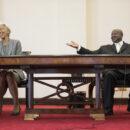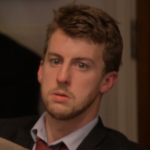Unsimplifying Darfur
The recurring theme of Rob Crilly’s book, ironically entitled Saving Darfur, is that Darfur only looks simple from a distance. Close up, it’s much more like the other complicated wars that a foreign correspondent posted to Africa has to follow on a month-to-month basis.

A second theme is how a human interest story can be a vehicle for making serious points and reaching a wider audience. Crilly’s best example of this is not from Darfur, but is the infamous “teddy bear” story, when a British teacher at an international school in Khartoum was arrested and charged with insulting religion after she named the class teddy bear “Mohammed”, after a chubby boy in the class. A news story whose headline was an invitation to mock Sudan, and especially zealots who wanted to score political points at the expense of a naí¯ve schoolteacher, in fact yields insight into different layers of dynamics within the Sudanese establishment, and between it and a western government.
Saving Darfur has garnered most attention for its critique of the Save Darfur movement – especially Crilly’s charge that in over-simplifying the conflict and elevating the rebels into “the good guys” it has impeded finding a solution. Readers of this blog will be familiar with these arguments.
But Crilly’s starting point is not some abstract contrarianism: it is his personal discomfort with being framed as a saviour by Darfurian people. Visiting the SLA-controlled Jebel Marra, Crilly was asked to speak to the assembled community. He looks over their hopeful faces and the banners with messages such as “Go on International Criminal Court” and “Welcome UN”. He writes (pp 39-40):
“So I began to explain how I was not an aid worker or a UN official with the ability to order up trucks of food or helicopters for the wounded, but a journalist with no power other than the ability to take their stories to the outside world. Maybe then things will start to change, I suggested, looking out across the crowd of children, their eyes wide with hope as they held their handwritten signs calling for the UN and ICC to save the people of Darfur. It was one of the most depressing sights I had even seen. In some ways it is easier to deal with misery, with mothers holding skeletal children as they tell how their village was burned and their menfolk killed. It is a tale I have heard all across Sudan and all across Africa in slightly different forms. It is the bread and butter of being a foreign correspondent. After a while it goes down into the notebook without even triggering any emotion. What is infinitely more difficult to deal with is hope: the belief that the outside world can solve the problems of Darfur; that the soldiers of the UN will one day ride to the rescue; or that the ICC will end Sudan’s culture of impunity. In short, the faith that people in faraway lands give enough of a damn to really make a difference. That was the sentiment that lay in the simple banners displayed by the children. They had hope in institutions many in the West had given up on long ago. They believed that outside help could save their lives, rebuild their villages and send them home – yet for four years nothing had changed in Darfur, despite countless UN resolutions. I doubted my reports in British, Irish and American newspapers would help the people who stood before me.”
Crilly’s Darfur is not only politically complicated, but morally ambiguous too. His book is in part a plea that Darfur not be reduced to a black-and-white morality tale. He describes Arabs who have become rebels, and Arabs who are victims of atrocities by the rebels, the legacy of decades of war in southern Sudan””not least the LRA, and how aid and peacekeepers have brought an economic boom to Darfur’s main towns. But he does not shy away from making it clear that the main responsibility for what has happened falls on the government.
Darfur’s war is both a depressingly ordinary African conflict, and also an extraordinary political event. Rob Crilly’s book shows both facets.







I’ll be taking a look at this one as soon as it’s released in the United States on Feb. 28.
Thanks so much for your thoughtful book reviews. I find them extraordinarily useful. Would like to see even more of them.
This sounds like another important book to read on Darfur.
Lack of understanding of the realities in Darfur (and all of Sudan) by Western decision makers has aggravated the situation in Darfur; and it sounds like books like this book by Crilly can help to correct this.
Sounds like a very astute book with exactly the right framing of the issue.
Not just western decision makers…anyone who feels the need to “do something” but is satisfied with sound bytes to direct their actions
What’s going on in Darfur is absolutely horrifying. I was at the NY Independent film fest and the one film that stood out was Attack on Darfur. I’m really glad there are different mediums that are bringing the political aspect to a forefront and making people aware of the terrible things going on in today’s world. It won Best feature film so I guess they thought it was important too!